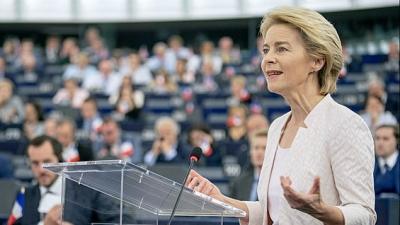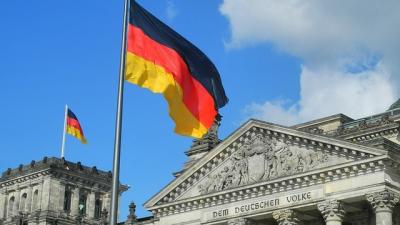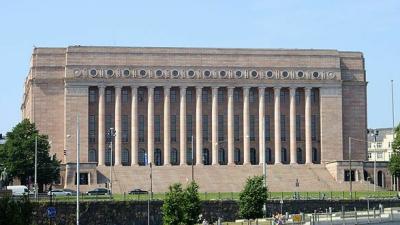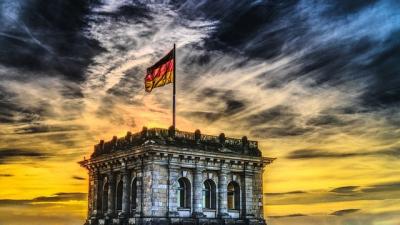How firmly is EU Commission President Ursula von der Leyen in the saddle? If one follows official accounts, then everything speaks in favour of the German seeking a second term in office and having broad support for it. Alexander Graf Lambsdorff, former Vice-President of the European Parliament and present Vice-President of the FDP (ALDE) in the Bundestag, is backing von der Leyen: "From the German point of view, a second term for Ursula von der Leyen would of course make sense," he tells the Tagesspiegel. But Lambsdorff makes this extension dependent on one condition: She must run as the EPP's top candidate. And win the election.
Because not everyone has forgotten how the former German defence minister's candidacy went in 2019. Namely, the EPP had actually nominated Manfred Weber as its top candidate. Despite some losses, the EPP subsequently provided the strongest parliamentary group, and Weber won against his socialist rival Frans Timmermanns. However, the EU summarily cancelled the top candidate system, which had previously been presented as democratic progress. The European Council nominated von der Leyen, who then received a majority of the votes.
If you look at the result at that time, it is easy to see why the Leyen question has become more relevant than ever. The German SPD or the Green parliamentary group did not vote for the Christian Democrat. Instead, she received votes from Viktor Orbán's "Fidesz", the PiS, Silvio Berlusconi's "Forza Italia" and the left-wing "Movimento 5 Stelle". The result was 383 to 327. The parties just mentioned brought von der Leyen additional 59 votes. It is questionable whether they will vote in a similar constellation next year as they did then. A possible shift towards the right has not even been taken into account.
The EU was able to push its candidate through by hook or by crook, not least thanks to the intercession of Emmanuel Macron - but how can that be possible if this time the top candidate system is to decide the matter? Moreover, von der Leyen's position within the EPP is less secure than it appears. Weber, who was the de jure winner of the election but de facto the loser, is still the leader of the parliamentary group. Unlike Timmermanns, Weber has not been given any office - the Dutchman is Commissioner for Climate Protection. Weber's flirtation with the parties to the right of the EPP, especially on the migration issue, has become obvious in recent months,. Apparently, the parliamentary group leader is seeking to secure his house power - though not necessarily for the Commission President who has stolen the post from him. On the other hand, Weber has recently made a strategic mistake of wanting to build a "firewall" against the PiS. In other words: the EPP is playing a cat-and-mouse game with the ECR parliamentary group, but at the same time wants to have its support like in 2019. Without concessions, however, this is hardly likely.
Support of the ECR is of fundamental importance if the EPP wants to remain in power through the election of a leading candidate. While it does not look likely that a left majority will be returned by the next European election, the centrists nevertheless probably hope to be strong enough not to be too dependent on the left in the election - as already shown by the last election, in which many members of the S&D group also withheld their support.
As things stand, the strength of the ECR faction is likely to increase significantly in the next election. In Spain, Vox is gaining. The Finns Party has meanwhile joined the ECR. But the "Fratelli d'Italia", bursting with strength, is likely to tip the balance if it can grab the Lega's votes next year - and grow to a strength similar to that possessed by the Lega now. Unlike the PiS, Meloni's party has already voted against von der Leyen in 2019. This is unlikely to have been forgotten in Brussels.
It is therefore remarkable that Meloni and von der Leyen show a hitherto unknown familiarity - for example, at the EU meeting with Tunisian President Kais Saied. Besides von der Leyen and Meloni, Dutch Prime Minister Mark Rutte was also present there. Von der Leyen held out the prospect of a total of around 1.1 billion for the Tunisian state budget, 150 million of which could be granted "immediately". Saied announced that his country would not play the "border police" for Europe. But that is de facto the role that Meloni has assigned to Tunisia. Italy is thus forcing its foreign policy through Brussels and involving the EU in the donations. It should be obvious that such a move is also welcomed by the Germans in order to bind the Italians to them.
On the other hand, Meloni is probably also aware of her position and is exploiting it. People will work with the EU as long as the future of the Commission President remains unclear. The prime minister has the advantage of being able to wait and see. The government in Rome is extraordinarily stable by Italian standards, and the next election is four years away. In Berlin, a quarrelling three-party coalition is governing, with growing popular resentment, and in the French parliament Macron currently has no firm majority. Thus, Meloni is also a reliable address as head of government in the coming years. In the process, the Roman lady has an option of her own: should the ECR tip the scales and grow to the point where "firewalls" or "post-fascist" comparisons seem unwise, she could have her own say if the ID loses significance and a large right-wing faction is in prospect. Europe's most important woman will then no longer be in Brussels, but on the Tiber - possibly also because a man will then once again head the EU Commission.
Read also
Country Report: Germany, January 2023
Germany's desperate search for geopolitics
Marco Gallina
The Finnish election is a signal for European conservatives
Sanna Marin is history. This is not without irony: usually, it is the "woke" young generation that overturns monuments to great historical figures. Yet this time, with Marin, a left-wing icon only 37 years old is toppling. She was a figurehead even in the liberal camp.
Marco Gallina
A delicate smell of Stalinism in German air
German Federal Minister of the Interior is considered Minister of the Constitution. He is therefore also in charge of the Federal Office for the Protection of the Constitution (Verfassungsschutz), the federal office responsible for collecting and evaluating information on actions efforts against the free basic order.
Marco Gallina
The Question of Oriental Christians is a European Question
Europe will be Christian again, or it will no longer be at all. How Christian it truly is, is also shown by how much it stands by its fellow Christians. In the case of Christianity in the Orient, the very region of origin of the religion that had made Europe what it was and what it is now - things look bleak.














Comments (0)